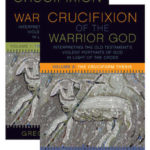We run our website the way we wished the whole internet worked: we provide high quality original content with no ads. We are funded solely by your direct support. Please consider supporting this project.

What About the Harsh Words of Paul? A Response to Paul Copan (#4)
This post is my fourth response to a talk given by Paul Copan at the Evangelical Theological Society in November in which he raised a number of objections to Crucifixion of the Warrior God. A major part of Copan’s critique centered on my claim that the love of God that is revealed on the cross, and the love we are called to walk in, is altogether non-violent (or, as Copan prefers, “non-coercive”). One of the arguments he uses to make this point is that Paul sometimes used harsh words of opponents that don’t seem to comport with my cross-centered understanding of love. Paul referred to certain opponents as “dogs” (Phil 3:2). He wished that those who taught that Gentiles must be circumcised would “castrate themselves” (Gal 5:12). And he declared a curse upon anyone who preached a message different from his own (Gal 1:8–9).
I have to grant that these examples indicate that Paul occasionally used language that conflicts with my cross-centered understanding of love. But rather than allowing Paul’s language to qualify our understanding of love, think we should instead conclude that Paul was a fallible human being who didn’t always live up to the Gospel he preached.
I simply do not see how calling a group of people “dogs” is consistent with Jesus’s teaching that we are never to apply slanderous labels to people (Matt 5:22) or with Paul’s own instruction to avoid using demeaning language for others (e.g., Eph 4:29, 31; 5:4; Col 3:8). Nor can I see how Paul’s insulting language is consistent with his own instruction to bless people and to never curse them (Rom 12:14), to never return evil with evil but to instead return evil with good (Rom 12:17; cf. 1 Cor 4:13), and to always treat enemies with loving kindness (Rom 12:19–21). And I certainly do not see how Paul’s insulting language is consistent with his teaching that followers of Jesus are to do “everything in love” (1 Cor 16:14, emphasis added)—an instruction that surely includes referencing theological opponents. When we consider that the early church defined the love that God is and that we are to imitate by pointing us to the cross (I Jn 3:16; cf. Eph 5:1-2), the unloving nature of Paul’s name-calling becomes all the more glaring.
Conceding this point simply means we must accept that Paul was not perfect. And this should not surprise us since Paul, to his credit, openly acknowledges this fact (Phil 3:12-13). Nor should it surprise us that God accommodated Paul’s imperfections when he “breathed” his word through him. This should be no more problematic then the fact that God accommodated Paul’s faulty memory when he “breathed” through him (I Cor 1:14-15).
Not only this, but since God “breathed” his definitive revelation through Christ as he bore the sin of the world, why should anyone suspect that Scripture, which is “breathed” for the ultimate purpose of pointing us to this definitive revelation, would be totally devoid of sin? The cross makes it clear that God has no problem accommodating sin in the process of “breathing” revelations of himself.
Yet, while Paul’s “old self” occasionally comes through in his writings, there is nothing in his inspired teachings that qualifies the unconditional, self-sacrificial, non-violent, enemy-embracing nature of God’s love that was fully revealed on the cross. I thus don’t consider Copan’s use of Paul against my Cruciform Thesis to constitute a particularly strong objection to it.
Photo by stucklo6an on Visualhunt.com / CC BY-NC-ND
Category: General
Tags: Crucifixion of the Warrior God, Love, Non-Violence, Paul Copan
Topics: Attributes and Character
Related Reading

The Cruciform Way of the Lamb
In this video, Greg offers insight into how to read the Bible with the cross at the center of the revelation of God, thereby reframing how we interpret the violent and nationalistic passages of the Old Testament. Travis Reed from The Work of the People did a series of interviews with Greg a while ago and…

Endorsements for Crucifixion of the Warrior God
Greg has gotten some really great endorsements for his upcoming Crucifixion of the Warrior God, so we thought we’d share them with all of you. If you want to learn more, you can go here. Enjoy! “We now have a plenitude of studies preoccupied with the vexed question of the violence of God in the Bible.…

God’s Kind of Warfare
Over and over, and in a variety of different ways, we are told that, while “[s]ome trust in chariots and some in horses,” Israelites were to “trust in the name of the LORD our God” (Ps 20:7), for “[n]o king is saved by the size of his army” and “no warrior escapes by his great…

No Room for Judgment
In the light of the horrible violence in Orlando, and in response to the sickening judgmental statements that some Christian leaders have been making since the mass shooting about the victims who belong to the LGBTQ community, this is a time to remember our calling to revolt against all judgment as kingdom people. In the…

Podcast: Does God ALWAYS Act Out of Love?
Greg talks about the nouns and verbs of God. Dan talks about unicorns named Gary. http://traffic.libsyn.com/askgregboyd/Episode_0411.mp3

The Lego Movie & Free Will
Last week Greg tweeted about two movies that have themes related to human free-will and God’s control of the world. They were: @greg_boyd: Does God want a permanently frozen “perfect” world or an open-ended world filled with wildly imaginative people? Watch “The Lego Movie”! @greg_boyd: Meantime, me & some peeps are going to watch (again!)…
